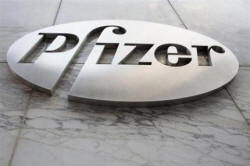|
The deal would be the largest foreign takeover
of a British company and has raised fears that resulting cost
cutting would see the loss of thousands of skilled jobs,
undermining the UK's science base.
AstraZeneca, Britain's second-largest drugs company, has
rejected successive approaches from its larger American rival.
As political opposition to the plan grew, Pfizer reiterated its
commitment to the deal, posting a graphic on its website that
touted the benefits of a merger.
It said the combined group would be able to expand its global
research, speed up the development of treatments and broaden its
footprint in emerging markets.
A combined Pfizer-AstraZeneca would be the world's largest
pharmaceuticals business and save Pfizer billions of dollars in
taxes by shifting its domicile to Britain, although it would
still be run out of New York.
In a mounting war of words, Pfizer quoted the former chairman
and CEO of AstraZeneca rival GlaxoSmithKline, Richard Sykes,
saying the deal was a "fantastic opportunity" and "Pfizer are
serious and they've got a lot of money to spend".
But British Prime Minister David Cameron is facing growing
pressure from lawmakers to secure promises about jobs, research
and intellectual property. On Tuesday, Business Secretary Vince
Cable said the government could use its public interest powers
to intervene in the deal.
On Tuesday, AstraZeneca laid out its defense strategy, touting
its strong long-term growth potential as an independent company.
(Reporting by Ben Hirschler; editing by Tom Pfeiffer)
[© 2014 Thomson Reuters. All rights
reserved.] Copyright 2014 Reuters. All rights reserved. This material may not be published,
broadcast, rewritten or redistributed.
 |
|






